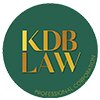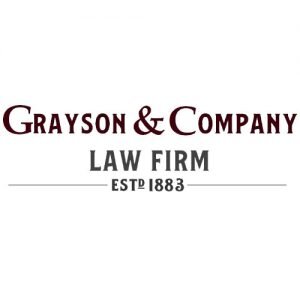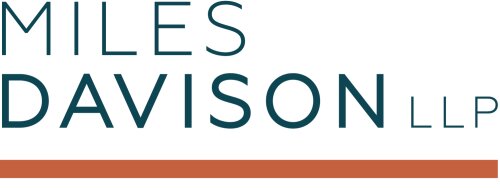Best Hiring & Firing Lawyers in Canada
Share your needs with us, get contacted by law firms.
Free. Takes 2 min.
Or refine your search by selecting a city:
List of the best lawyers in Canada
About Hiring & Firing Law in Canada
Hiring and firing laws in Canada are rooted in both federal and provincial legislation, striving to balance the rights and responsibilities of employers and employees. Employment relationships in Canada are primarily governed by employment contracts, labor standards, human rights legislation, and common law decisions. Whether it’s hiring practices, employment contracts, or termination procedures, the legal framework seeks to ensure fairness, non-discrimination, and appropriate compensation or notices for employees. Understanding these laws is crucial for both employers and employees to avoid potential legal disputes.
Why You May Need a Lawyer
There are several situations in which individuals or companies might benefit from legal assistance in hiring and firing matters. These include:
- Drafting or reviewing employment contracts to ensure compliance with legal standards.
- Navigating complex employment terminations, including layoffs, for-cause dismissals, and handling wrongful dismissal claims.
- Addressing accusations of workplace discrimination or harassment.
- Understanding the nuances of severance pay and notice periods.
- Resolving disputes over breach of contract or non-competition clauses.
- Assistance with employment-related negotiations or mediations.
Legal advice can help protect rights, ensure compliance with laws, and guide all parties toward a fair resolution.
Local Laws Overview
Employment law in Canada varies between provinces and territories, each having their specific labor standards while also adhering to federal laws. Key aspects include:
- Employment Standards Act: Sets out minimum conditions for hours of work, wages, overtime, and termination.
- Human Rights Legislation: Prohibits discrimination in employment on various grounds, including race, gender, and age.
- Collective Bargaining and Labor Relations: Governs unionized workplaces and collective agreements.
- Common Law: Judicial precedents that impact employment practices, especially concerning wrongful dismissal and contractual rights.
- Occupational Health and Safety: Outlines the duties of employers to ensure a safe workplace.
It is essential to understand these laws to ensure lawful hiring and termination practices.
Frequently Asked Questions
What constitutes wrongful dismissal in Canada?
Wrongful dismissal occurs when an employee is terminated without cause and not provided reasonable notice or compensation in lieu, as required by law or their employment contract.
Are there specific laws about firing employees in Canada?
Yes, termination laws vary across provinces but generally require employers to provide notice or pay in lieu of notice unless termination is for cause. Employers must also comply with human rights and employment standards legislation.
How much notice is required for termination?
The notice period depends on factors such as the employment contract, provincial employment standards, and common law considerations like the employee's length of service, age, and position.
What protections are there against discriminatory hiring practices?
Canadian human rights laws prohibit discrimination in hiring based on race, gender, sexual orientation, disability, and other protected characteristics. Employers must ensure equitable recruitment practices.
Can an employer terminate an employee on medical leave?
Employers are generally prohibited from terminating employees on medical leave, as this may constitute discrimination based on disability. Certain exceptions exist under specific circumstances.
What is constructive dismissal?
Constructive dismissal occurs when an employer unilaterally makes a significant change to an employee's job, such as duties or pay, thus essentially forcing them to resign. Employees may seek damages if they can prove constructive dismissal.
Are there laws concerning probation periods?
Probation periods are common and often stipulated in employment contracts. During this time, employers may terminate employment with a shorter notice period in most provinces, but must still ensure non-discriminatory practices.
How is severance pay calculated?
Severance pay depends on factors such as employment length, age, position, and employment contract terms. Provincial employment standards also set minimum requirements.
What should be included in an employment contract?
Key elements include job description, compensation, probation period, benefits, termination clauses, confidentiality, and any non-compete agreements. Legal guidance is advisable when drafting or reviewing contracts.
Can legal action be taken for poor hiring practices?
Yes, if hiring practices contravene human rights laws or involve misleading information damaging to candidates, legal action may be justified.
Additional Resources
For individuals seeking further information or assistance, consider the following resources:
- Government of Canada - Employment and Social Development Canada: Provides extensive information on federal employment laws.
- Provincial labor ministries: Offer resources tailored to specific provincial regulations and standards.
- Canadian Human Rights Commission: Offers guidance on discrimination and human rights in employment.
- Legal Clinics: Provide free or low-cost legal advice and resources.
- Law Society of Ontario: Lists certified employment lawyers and provides professional guidance.
Next Steps
If you require legal assistance with hiring or firing issues in Canada, consider the following steps:
- Identify your specific needs, whether it's contract review, dealing with a dismissal, or addressing discrimination.
- Consult a lawyer specializing in employment law to discuss your situation and get professional advice.
- Gather all relevant documents, such as contracts, notices, correspondence, and any applicable policies or legislation.
- Prepare a list of questions or concerns to discuss during your consultation to make the most of the session.
- Consider mediation or alternate dispute resolution before proceeding with legal action, if applicable.
Proactively addressing your needs with legal counsel can help ensure compliance and protect your rights or interests.
Lawzana helps you find the best lawyers and law firms in Canada through a curated and pre-screened list of qualified legal professionals. Our platform offers rankings and detailed profiles of attorneys and law firms, allowing you to compare based on practice areas, including Hiring & Firing, experience, and client feedback.
Each profile includes a description of the firm's areas of practice, client reviews, team members and partners, year of establishment, spoken languages, office locations, contact information, social media presence, and any published articles or resources. Most firms on our platform speak English and are experienced in both local and international legal matters.
Get a quote from top-rated law firms in Canada — quickly, securely, and without unnecessary hassle.
Disclaimer:
The information provided on this page is for general informational purposes only and does not constitute legal advice. While we strive to ensure the accuracy and relevance of the content, legal information may change over time, and interpretations of the law can vary. You should always consult with a qualified legal professional for advice specific to your situation.
We disclaim all liability for actions taken or not taken based on the content of this page. If you believe any information is incorrect or outdated, please contact us, and we will review and update it where appropriate.
Browse hiring & firing law firms by city in Canada
Refine your search by selecting a city.
















